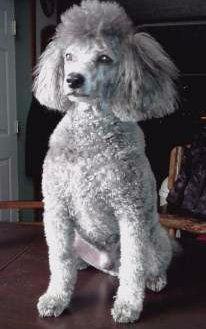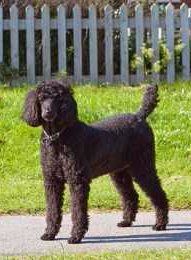Senior Poodles
Overview
There is not an official age that a dog becomes a senior; this is something that the Poodle's veterinarian will discuss with you as your dog is aging.
In general, smaller dogs live slightly longer lives than larger ones; they age a bit slower and for this reason Toy Poodles and Minis are often declared to be a senior by the 8 or 9 year old mark. Standard Poodles become seniors earlier, often by the 7 year old mark.
Even if the vet does not make an official announcement, any dog that is at least 9 years old will be considered to be in his or her senior years. This does not mean that your Poodle will suddenly be old. Rather, it is a slow process and being declared a senior will mean that the dog should begin to have geriatric screenings twice per year (to check for common health issues that occur with older dogs) and that there should be some changes in regard to care.
Ahead we will look at some of the common signs of aging and what to expect with your senior Poodle.
Slowing Down
One of the most noticeable changes will be a dog that slows down, in just about all aspects. The tricky thing is that nothing happens overnight. It is usually not until a Poodle is really struggling that owners will take notice. As a dog gets older he/she may slowly and steadily show signs of:
- Having a more difficult time rising from a laying down position
- Taking longer to climb steps
- Being hesitant to climb down steps
- Not running and playing as usual, or wanting to run and play but tiring out sooner than when they were a puppy or adolescent
The above slowing down signs can often be attributed to arthritis which can be treated with prescribed medication from your Poodle’s veterinarian. For toy Poodles
and miniature Poodles, obtaining pet ramps and pet steps can help your Poodle reach the places that they are used to. For Poodles of any size, a high quality orthopedic pet bed can greatly help with sore joints and muscles.
Vision and Hearing Changes
It is a normal process of aging that vision and hearing abilities will be decreased. Because of this, an older Poodle does best when routines are kept and changes are not made. One of the most important things that you can do is not to rearrange the furniture in your home and keep all toys and food and water bowls in the same place.
An older Poodle does well when commands are given both vocally and by hand signals. It helps to begin this well before your senior Poodle has any hearing loss. Approaching your dog from the side, as so not to startle him or her is also recommended.
Changes to the Coat
While it does not occur with all Poodles, dog of any breed can develop gray hairs, very much as we do as we grow older. While grooming is important at all stages of your dog’s life, do be sure to always use conditioner when bathing your older Poodle. Skin will be much more sensitive now and having exposed skin can cause skin to dry out quickly and can lead to sores. It is recommended to allow your Poodle to have a simple Puppy Clip, Utility Clip or Lamp Clip when in their senior years.
See also:
Grooming Tools.

Pepper, 10 years old
Photo courtesy of owner: Carrie Maples
Behavioral Changes
A senior Poodle may have a hard time accepting new situations and may have a harder time coping with what used to be normal situations. For example:
Separation anxiety
- An older Poodle may be much more aware of your presence and begin to feel nervous when left home alone. This can show in many ways such as destructive behavior, increased barking or depression. Setting up a comfortable environment, leaving on a radio or TV and/or hiring a dog walker or dog sitter to check in with your Poodle can help. Many people wonder if getting a new puppy will help an older dog cope with loneliness. This depends greatly on your current Poodles ability to accept a new puppy and their tolerance for the playing and high activities levels that the puppy will have.
Sensitivity –
An older dog may become afraid of loud noises, such as trucks backfiring, slamming doors or thunder storms. Do try to control the elements that you can.
Housebreaking Accidents -
If this occurs, it is important to have your Poodle’s veterinarian complete a checkup, as anything from a bladder infection to stomach
tumors can be the cause. If it is a simple sign of canine old age, the use of belly bands or diapers can be of great help. While your Poodle may need to become accustomed to either of these, it can help as a dog’s self confidence can be destroyed when they keep having accidents.
Sleep –
While dogs do sleep more than we do, senior Poodles will usually sleep even more. It is best to accept this, never waking up your dog and allowing them to rest when needed. Be sure to offer a quiet, comfortable resting and sleeping area. As a dog enters the senior years they may either want a very quiet place to retreat to or they may want to be closer to the family. By trying out both, you will be able to know which change your Poodle appreciates.
Keeping Your Senior Poodle Healthy
Screening for Illness -
The potential for certain diseases increases with a dog’s age. It is important to bring your Poodle for geriatric veterinarian screenings. Many canine illnesses can be treated and there is no reason for a dog to suffer when so many treatments are available.
Weight -
Help your Poodle maintain a good body weight. You may notice that your dog gains weight as they grow older, most often because activities such as long walks are cut short. It is best to continue feeding your Poodle very high quality food, we highly recommend home cooking, as this offers your dog real food with zero fillers.
Dental Care -
Canine dental care
is important at any age, and even more so as a Poodle ages. Periodontal disease is the 2nd most common health ailment for senior dogs and this breed is already prone to tooth decay.
Daily brushings at home are important as ever and either home scraping or professional scraping must not be ignored.
Observation -
While the world spins fast and some days seem to only last hours, we must take time to have a good look at our senior Poodles each day. Look for any physical signs, but also behavioral signs as well and do not hesitate to bring your Poodle to the vet. Early treatment is the best method to a fast recovery from any health issue.

